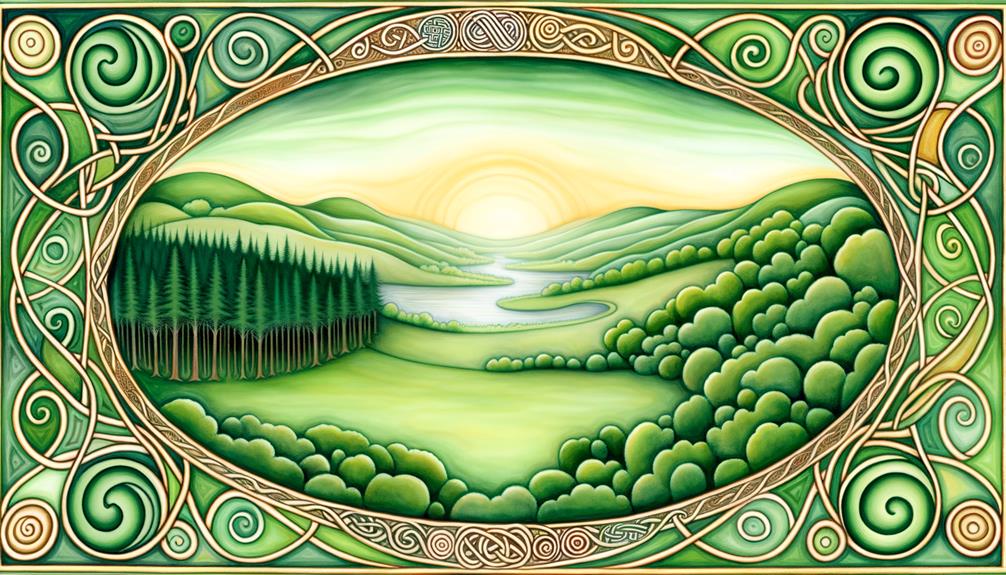Meaning of the Name Gael
The name Gael originates from the Old Gaelic word 'Goidel', tracing back to Proto-Celtic '*gʷēdels.' It symbolizes the linguistic and cultural heritage of Gaelic-speaking societies, particularly within the Goidelic branch of Celtic languages. Historically, it evolved through Middle Irish as 'Gaoidheal' and into Modern English as 'Gael.' The name reflects profound cultural significance among Gaelic-speaking peoples and their rich oral traditions.
Popularity has risen in various regions, including the United States and Mexico, due to its phonetic appeal and cultural resonance. Explore further to uncover more about its cultural and historical journey.

Key Takeaways
- The name Gael originates from the Old Gaelic word 'Goidel'.
- It represents the Gaelic ethnicity and linguistic heritage.
- Gael is emblematic of the Goidelic branch of Celtic languages, such as Irish and Scots Gaelic.
- The name symbolizes the identity and kinship of Gaelic-speaking peoples.
- Gael is a gender-neutral name with cultural depth, popular in various countries.
Etymology of Gael
The name Gael originates from the Old Gaelic word 'Goidel,' which refers to the Gaelic-speaking people of Ireland and Scotland.
Linguistically, 'Goidel' traces its roots to the Proto-Celtic '*gʷēdels,' implying 'forest people,' reflecting the ancient Celts' connection to their natural environment.
The term evolved into Middle Irish as 'Gaoidheal,' eventually becoming 'Gael' in Modern English. This etymological progression underscores the cultural and linguistic shifts over centuries.
The transformation from 'Goidel' to 'Gael' illustrates the adaptation of Gaelic languages in response to socio-political changes and external influences.
In contemporary usage, Gael signifies not merely an individual but embodies a rich heritage of Gaelic linguistic and cultural traditions.
Historical Origins
The name Gael originates from the Celtic languages, embodying a rich tapestry of ancient cultural significance among the Gaelic-speaking peoples.
Historically, it reflects the intricate interplay between language and identity in early Celtic societies.
The evolution of the name through the medieval period further underscores its enduring relevance and adaptation across various historical epochs.
Celtic Language Roots
Rooted in ancient Celtic languages, the name Gael finds its origins in the Gaelic-speaking communities of Ireland and Scotland. The term 'Gael' is derived from the Old Irish word 'Goídel,' which itself traces back to Proto-Celtic *g·eidelo-. This linguistic lineage underscores the deep historical and cultural connections among Celtic peoples.
The evolution of the name reflects the migration and interaction of these communities over centuries. In linguistic terms, Gael is emblematic of the Goidelic branch of the Celtic languages, distinct from the Brythonic branch spoken in Wales and Brittany. This differentiation highlights the unique phonological and syntactical features that characterize Goidelic languages, such as Irish and Scots Gaelic, thereby embedding the name Gael within a rich tapestry of linguistic heritage.
Ancient Cultural Significance
Emerging from the annals of ancient Celtic society, the name Gael carries significant cultural weight, symbolizing the identity and kinship of the Gaelic people.
Rooted in the historical Gaelic tribes of Ireland and Scotland, the term 'Gael' stems from the Old Irish word 'Goídel,' which denotes a person of Gaelic ethnicity.
This nomenclature not only signifies ethnic origin but also encapsulates the linguistic heritage, as the Gaelic language served as a unifying thread among these communities.
The Gaels were known for their rich oral traditions, warrior culture, and intricate social structures. Hence, the name Gael is imbued with connotations of belonging, linguistic unity, and a shared historical narrative, reflecting its profound cultural significance in ancient Celtic society.
Medieval Name Evolution
As the Gaelic identity evolved through the medieval period, the name Gael began to adapt and integrate into various forms across different regions, reflecting the dynamic interplay between linguistic and cultural shifts. This era saw the name influenced by the migration patterns and socio-political changes of the time, leading to its varied adaptations.
| Region | Name Form |
|---|---|
| Ireland | Gael |
| Scotland | Gaidheal |
| Brittany | Gall |
Linguistic transformations were driven by the interplay of Gaelic languages and the administrative impositions of medieval ruling powers. The name Gael in Ireland retained its original form, while in Scotland it morphed into Gaidheal, influenced by Old Norse and Pictish languages. In Brittany, the name became Gall, reflecting the region's unique Celtic and Latin heritage.
Cultural Significance
The name Gael frequently carries profound cultural significance, particularly within communities of Celtic heritage. Historically, the term 'Gael' refers to the Gaelic-speaking people of Ireland and Scotland, emphasizing a connection to ancient Celtic traditions and languages.
This appellation invokes a deep sense of identity, rooted in a shared ancestry and cultural memory that spans centuries. The Gaelic civilization, noted for its rich oral traditions, epic poetry, and distinctive art forms, imbues the name Gael with a resonance that transcends mere nomenclature.
Linguistically, it encapsulates the essence of a people who have navigated historical upheavals while preserving their linguistic and cultural heritage, making it a symbol of resilience and continuity within the broader context of Celtic history.
Linguistic Variations
Building on the cultural significance of the name Gael, its linguistic variations reflect the diverse phonetic and orthographic adaptations across different Celtic and non-Celtic languages.
For instance, in Irish, the name appears as 'Gael' or 'Gaelio', emphasizing its Gaelic roots.
In Breton, it is rendered as 'Gaël', showcasing a unique diacritical mark.
The name also exists in Spanish as 'Gael', maintaining its original form but with distinct pronunciation nuances.
To illustrate linguistic diversity:
- Irish: 'Gael' or 'Gaelio'
- Breton: 'Gaël' with diacritical mark
- Spanish: 'Gael' with pronunciation variation
- French: 'Gaël', similar to Breton, but with unique phonetic characteristics
These variations highlight the name's adaptability and cultural resonance across languages.
Popularity Over Time
Historically, the name Gael has experienced fluctuating levels of popularity, influenced by cultural trends and regional naming conventions. Initially rooted in early Celtic traditions, the name saw periodic resurgence, particularly within Gaelic-speaking communities.
By the mid-20th century, its appeal broadened beyond these enclaves, partly due to increased global interest in Celtic culture and heritage. Data from national registries reveal that Gael gained significant traction in the early 2000s, particularly in countries like France and the United States.
This surge can be attributed to the rising global interconnectedness and the subsequent blending of naming practices. Linguistic analysis indicates that the name's phonetic simplicity and cross-cultural resonance have contributed to its enduring presence in contemporary naming trends.
Famous Namesakes
Among the notable individuals bearing the name Gael, several have greatly impacted fields such as arts, sports, and politics, underscoring the name's broad cultural significance.
Gael García Bernal, a distinguished Mexican actor and producer, has achieved international acclaim through his roles in critically acclaimed films like 'Amores Perros' and 'The Motorcycle Diaries.'
In the domain of sports, Gael Monfils, the French tennis player, has been a prominent figure on the ATP Tour, known for his athleticism and charismatic presence.
Politically, Gael Yanno, a New Caledonian politician, has played a significant role in regional governance.
These individuals illustrate the diverse arenas where the name Gael has left a mark.
Modern Usage
In contemporary nomenclature, the name Gael has seen a significant rise in popularity across diverse regions, particularly in the United States and Latin America. This surge can be attributed to its cultural resonance and linguistic adaptability, reflecting a broader trend towards names with historical and mythological significance.
Analyzing its modern usage reveals insights into current naming conventions and the enduring appeal of Gaelic heritage in global contexts.
Popularity Across Regions
Gael has seen a significant rise in popularity in various regions worldwide, particularly in the United States and Latin American countries. This name, originally rooted in Celtic and Breton cultures, has transcended its historical confines, becoming a contemporary favorite.
The following points illustrate its widespread adoption:
- United States: Gael entered the top 1000 baby names in the early 2000s and continues to climb.
- Mexico: Often chosen due to its phonetic appeal and cultural resonance.
- France: Historically significant, Gael retains a steady presence.
- Spain: Gaining traction due to its melodic quality and ease of pronunciation.
Linguistic adaptability and the name's modern phonetic appeal have contributed to its cross-regional popularity, reflecting a blend of traditional and contemporary influences.
Cultural Significance Today
Embracing its Celtic and Breton roots, the name Gael embodies a unique blend of historical significance and modern appeal in contemporary culture. Deriving from the Gaelic term 'Gaidheal,' it originally referred to speakers of the Gaelic languages.
Today, Gael resonates beyond linguistic boundaries, symbolizing a connection to Celtic heritage. Its adoption in various cultures highlights a resurgence in valuing historical identities. In the United States and Europe, Gael has gained popularity, reflecting broader multicultural influences and a penchant for distinctive, meaningful names.
The name's versatility is evident in its gender-neutral usage, making it a contemporary favorite. Gael's modern relevance underscores the enduring allure of names that bridge the past and present, offering both cultural depth and contemporary flair.
Conclusion
In sum, the name Gael, rooted in rich etymology and historical origins, bears a cultural significance that transcends linguistic boundaries. Its varied forms and sustained popularity through time highlight its enduring appeal.
As a beacon of heritage, Gael is revered by many, from ancient times to modern usage. This name, embodying a legacy of strength and identity, continues to inspire, demonstrating the timeless nature of human connection to history and language.






